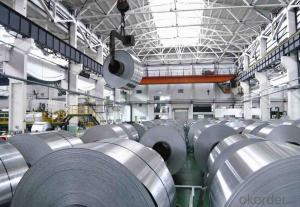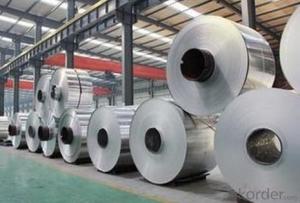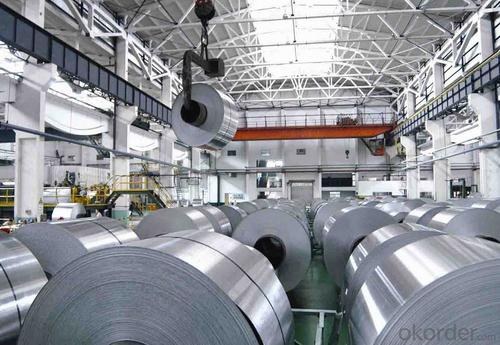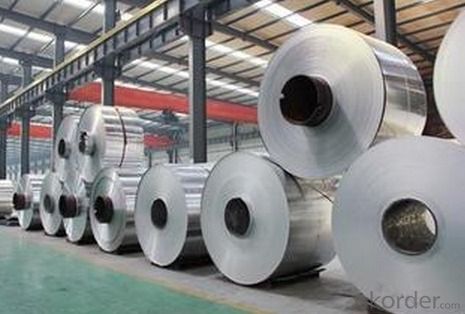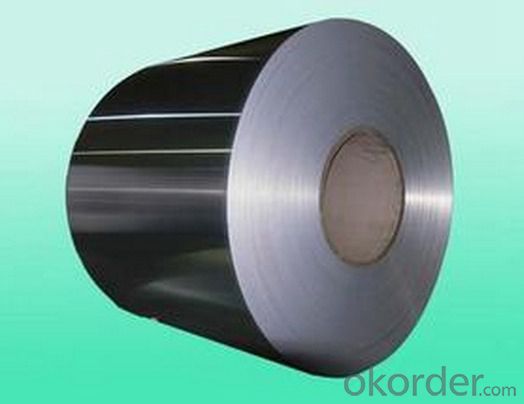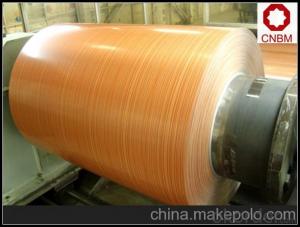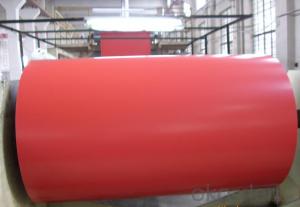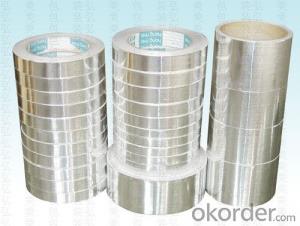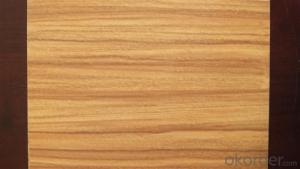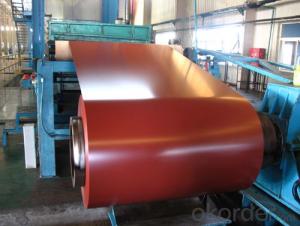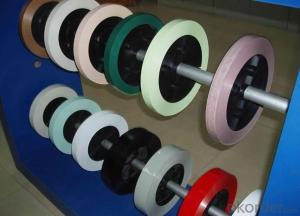Aluminum Coil 0.05 X 102 - PE/PVDF Red Color Wooden Grains Aluminum Coil for Aluminum Composite Panel
- Loading Port:
- Shanghai
- Payment Terms:
- TT OR LC
- Min Order Qty:
- 1 m.t.
- Supply Capability:
- 2000 m.t./month
OKorder Service Pledge
OKorder Financial Service
You Might Also Like
Specification
Product Description:
Wooden pattern coated Aluminum coil /anodized aluminum coil 1100/3003 :
Our PVDF coated color aluminum coil is made of high-performance aluminum sheet and PVDF coating through advanced roller coating process.
Features:
1) Wear resistance 2) impact resistance 3) highly tensile strength 4) easy fabricating 5) UV resistance 6) weather resistance 7) corrosion- resistance 8) various colors
Aluminum foil range:
Thickness: 0.18mm-1.6mm
General Width: 1240mm, 1270mm, 1520mm, 1570mm, other special widths according to customer requirements;
Aluminum alloy: 1100,3003,8011,3105,5052, other alloys according to customer requirements.
Applications:
PVDF coated aluminum coil is a favorably choice of material for high-quality aluminum curtain wall, aluminum veneer sheet, Honeycomb panel. Its products are widely used in airports, convention centers, hotels and other high-end architectural curtain wall decoration
Aluminum Plates:
Aluminum coils / plates are widely used in building renovation (aluminum panels, honeycomb panels, aluminum veneer, tiles, ceiling, doors, windows, etc.), food packaging (such as bottle caps, lids). They can be used as cooling and temperature control material in electrical equipment.
| Aluminium series | Alloy | Temper | Thickness | Width | Pattern | Usage |
| 1000 series | 1050/1060/1070/1100 | H0-H112 | 0.3mm-5.0mm | 300mm-2200mm | Sheet/Coil | Chemical equipment, food industry equipment |
2000 series | 2014/2017/2024 | O,T3,T4 | 100mm-1250mm | Sheet/Coil | General Mechanical Components | |
| 3000 series | 3003/3004/3005/3105 | O/H32/H34/H36/H38/H116 | 0.2mm-6mm | 400mm-2000mm | Sheet/Coil | Building, PP cap material |
| 5000 series | 5005/5052/5083/5086/5182/5754 | O/H32/H34/H36/H38/H116 | 0.12mm-10mm | 20mm-2000mm | Sheet/Coil | Architectural decorative pieces, conductor, cookware |
| 6000 series | 6061/6205/6009/6010 | O/T4/T6 | 0.6mm-5mm | 100mm-1800mm | Sheet/Coil | Industrial structures, ships, trams, furniture components |
| 7000 series | 7038/7050/7075 | O/T6/T76 | 0.1mm-3.0mm | 400mm-2000mm | Sheet/Coil | Refrigerated containers, cryogenic equipment and storage tanks |
Quality Standard:
| Test Item | PE | PVDF | ||||||
| Chromatism(ΔE) | Ceiling Decoration | Engineer Ceiling | Primer Print | Back Print | Ceiling Decoration | Engineer Ceiling | ||
| ≤0.5 | ≤0.7 | ≤0.8 | ≤2.0 | ≤0.5 | ≤0.7 | |||
| Pencil Hardness | ≥HB (No Crack or peel off) | |||||||
| Adhensive Resistance | Grade 0;No crack or peel off after the circling&pasting | Grade 0;No crack or peel off after the circling&pasting | ||||||
| Impact Resistance | ≥0.5mm | 0.3-0.5mm | ≥0.5mm | 0.3-0.5mm | ||||
| 50kgs.cm | 20kgs.cm | 50kgs.cm | 20kgs.cm | |||||
| Boiling Water Resistance | no changes by circling after 2h boiling | no changes by circling after 2h boiling | ||||||
| T-Bend Flexibility | composite panel | Ceiling Decoration | Engineer Ceiling | Primer/Back Print | Composite Panel | Ceiling Curtain | ||
| ≤2T | ≤1T | ≤2T | ≤3T | ≤2T | ≤2T | |||
| Coating Thickness(μm) | Topcoat | Primer coating | Double printing | Back Print | Topcoat | Back Print | total coating thickness | |
| ≥16 | 9~11 | 25~28 | 9~12 | 18-20 | 9~11 | 25-28 | ||
| Solvent Resistent | Single print≥100 times | Double print≥200 times | Back Print:30-70 times | Back Print:30-70 times | ≥200 times | |||
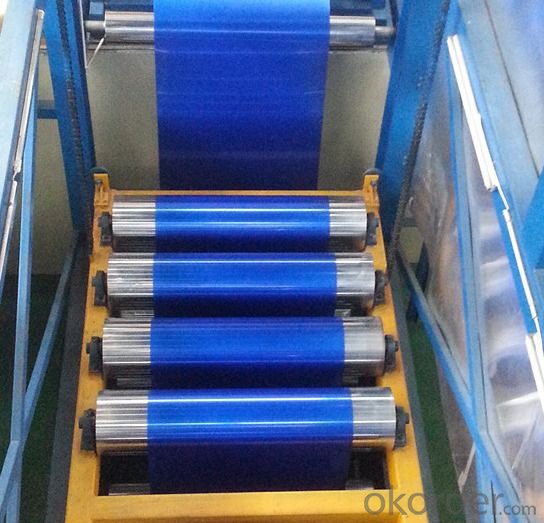
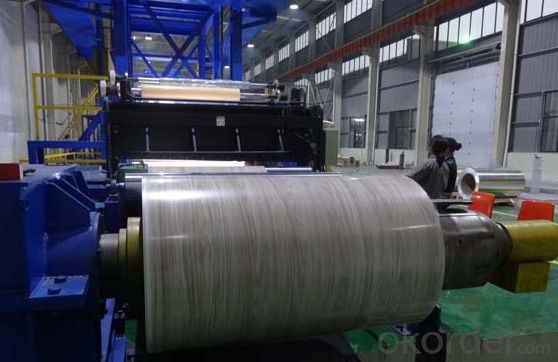
FAQ of PE/PVDF Red Color Wooden Grains Aluminum Coil For Aluminum Composite Panel:
1.Superior quality of raw material.
2.Reasonable and stable chemical composition.
3.Accurate tolerance.
4.Goode mechanical property.
5.We have the certificate of ISO9001.
- Q: Is it safe and practical to utilize aluminum coils for food storage purposes?
- <p>Aluminum coils can be used for storing food, but it's important to consider the type of food and the conditions. Aluminum is a good conductor of heat, making it suitable for cooking and preserving food in certain contexts, such as in foil form for wrapping food for baking or grilling. However, for long-term storage, especially of acidic or alkaline foods, aluminum may not be ideal due to potential leaching of aluminum into the food, which could be harmful. It's also crucial to ensure that the aluminum is food-grade and not contaminated with harmful substances. For most food storage needs, other materials like glass, stainless steel, or food-grade plastic are often preferred due to their non-reactive nature and safety.</p>
- Q: Can aluminum coils be used in the production of electronic devices?
- Yes, aluminum coils can be used in the production of electronic devices. Aluminum is a versatile and widely used material in various industries, including electronics. It possesses excellent electrical conductivity and thermal conductivity, making it suitable for use in electronic components such as coils and inductors. Aluminum coils are commonly used in power transformers, motors, generators, and other electronic devices where the transfer of electrical energy is necessary. Additionally, aluminum is lightweight, durable, and cost-effective, making it an attractive choice for manufacturers. However, it is important to note that the specific application and requirements of the electronic device will determine the suitability of aluminum coils.
- Q: How do aluminum coils contribute to energy-efficient appliances?
- Aluminum coils play a key role in enhancing the energy efficiency of appliances. The use of aluminum in coil form allows for efficient heat transfer, which is essential for appliances that require cooling or heating mechanisms. Firstly, aluminum coils have excellent thermal conductivity. This means that they can quickly absorb and dissipate heat, resulting in more efficient cooling or heating processes. This is especially important in appliances such as refrigerators, air conditioners, and heat pumps, where effective heat transfer is crucial for maintaining the desired temperature. Moreover, aluminum coils are lightweight yet durable, making them an ideal choice for energy-efficient appliances. The lightweight nature of aluminum reduces the overall weight of the appliance, which leads to lower energy consumption during transportation and installation. Additionally, the durability of aluminum ensures a longer lifespan for the appliance, reducing the need for frequent maintenance or replacement. Furthermore, aluminum is highly resistant to corrosion, which is a common issue in appliances that involve contact with water or moisture. By using aluminum coils, manufacturers can ensure the longevity and reliability of the appliance, thus contributing to energy efficiency by reducing the need for repairs or replacements. Lastly, aluminum is a highly recyclable material. Using aluminum coils in appliances promotes sustainability and reduces the environmental impact. By choosing energy-efficient appliances that incorporate aluminum coils, consumers can support the circular economy and contribute to a more sustainable future. In conclusion, aluminum coils greatly contribute to the energy efficiency of appliances. Their excellent thermal conductivity, lightweight yet durable nature, corrosion resistance, and recyclability make them an ideal choice for enhancing the performance and sustainability of energy-efficient appliances.
- Q: Are aluminum coils resistant to mold and mildew?
- Generally, aluminum coils have resistance to mold and mildew. Unlike materials like wood or fabric, aluminum is non-porous and does not absorb moisture. This characteristic reduces its susceptibility to mold and mildew growth. Moreover, protective finishes are often applied to aluminum coils, enhancing their resistance to mold and mildew. Nevertheless, it is important to remember that although aluminum coils are less prone to mold and mildew, they are not entirely immune. If exposed to excessive moisture or humidity, mold and mildew can still develop. Thus, regular cleaning and maintenance are essential to prevent potential mold or mildew growth.
- Q: What are the common surface defects or issues in aluminum coils?
- Aluminum coils may exhibit various surface defects or issues that can arise from different causes. These defects can have detrimental effects on the appearance, quality, and functionality of the coils. Therefore, it is crucial for manufacturers and users to be mindful of these defects and implement necessary measures to prevent or reduce their occurrence. Scratches, for instance, are visible marks on the coil surface that result from contact with abrasive materials or mishandling during production, transportation, or storage. Streaks, on the other hand, manifest as long, narrow lines or bands on the coil surface, often caused by irregularities in the rolling process or impurities present in the aluminum material. Dents are localized depressions or deformations that can occur due to mishandling, accidental impacts, or improper storage practices. Corrosion, though aluminum is generally resistant, can arise from specific environmental conditions or exposure to corrosive agents, leading to the formation of oxide layers or pitting on the coil surface. Edge cracks refer to fissures that appear along the coil edges, resulting from improper cutting or shearing during manufacturing. Surface roughness, characterized by an uneven or bumpy texture, can arise from inadequate smoothing or finishing during rolling or processing. Oil stains may be observed as dark or discolored areas on the coil surface, caused by improper cleaning or lubrication during production. Coil set refers to the coil's tendency to retain a curvature or shape after unwinding, resulting from stresses induced during rolling, coiling, or cooling, leading to an uneven and non-flat surface. Roll marks are patterns or imprints left on the coil surface by the rolling mill or equipment, caused by uneven pressure or improper tool alignment. Discoloration, characterized by changes in color or appearance, can result from exposure to high temperatures, chemical reactions, or oxidation. It is essential to recognize these surface defects and their potential impact on the quality and performance of aluminum coils. By taking appropriate preventive measures, manufacturers and users can minimize these defects and ensure the desired appearance and functionality of the coils.
- Q: Can aluminum coils be used for electromagnetic shielding?
- Yes, aluminum coils can be used for electromagnetic shielding. Aluminum is a highly conductive material, which makes it effective at blocking or redirecting electromagnetic fields. When coils made of aluminum are used in electromagnetic shielding, they can help prevent the transmission of electromagnetic radiation by reflecting or absorbing it. This shielding property is particularly useful in applications where electromagnetic interference needs to be minimized, such as in electronic devices, communication systems, or sensitive equipment. Additionally, aluminum coils are lightweight and have good mechanical properties, making them a practical choice for electromagnetic shielding.
- Q: What is the purpose or use of aluminum coil in various applications?
- <p>Aluminum coil is a versatile material used in a wide range of applications due to its properties such as lightweight, corrosion resistance, and high thermal and electrical conductivity. It is commonly used in construction for roofing and siding, in the manufacturing of heat exchangers and radiators, and in electrical applications like transformers and power lines. Aluminum coil is also utilized in packaging, such as food and beverage cans, and in automotive and aerospace industries for lightweight components. Its malleability allows it to be easily shaped and formed, making it an ideal material for various industrial processes.</p>
- Q: Some makes like KIA make a point of having aluminum engines. I thought this was for weight, but was more prone to failure, especially in a high mileage car.
- depends. i had a 79 F150, obviously engine made of steel. I let the water run out, the oil run out, the tranny fluid run out, etc. Couldnt kill that truck. I think the aluminum engines built today are fine, depending on the manufacturer. You cant run these engines into the ground though. I have had hondas and toyotas that ran forever with aluminum engines. Chrysler (dodge and plymouth) aluminum engines i have found are junk. I have been told by people who know to never buy a kia. if you can't afford a new car, buy a used one, like toyota, honda, never a nissan though. engines are just as good but the rest of the car is made out of pot metal. mazda is my favorite and many a ford has mazda engineering inside. the ford escape 4 cylinder is what i drive. it has a mazda engine.
- Q: Can aluminum coils be anodized for enhanced durability?
- Yes, aluminum coils can be anodized for enhanced durability. Anodizing is a process that creates a layer of aluminum oxide on the surface of aluminum, making it more resistant to corrosion, wear, and scratches. This layer also provides added protection against UV rays and harsh environmental conditions. By anodizing aluminum coils, they become more durable and can withstand prolonged use in various industries such as construction, automotive, and electronics. Additionally, anodized aluminum coils can be further treated with additional coatings or finishes to enhance their appearance and offer further protection. Overall, anodizing aluminum coils is a widely used and effective method to enhance their durability and prolong their lifespan.
- Q: Can aluminum coils be used in electrical wiring applications?
- Indeed, aluminum coils possess the capability to be employed in electrical wiring applications. For numerous years, aluminum has served as a conductor in electrical wiring, particularly in residential and commercial structures. As a lightweight and economical substitute for copper, it has been widely embraced. Aluminum coils find common usage in power distribution, transformers, and motors. Nevertheless, it is crucial to acknowledge that aluminum exhibits contrasting electrical and mechanical properties in comparison to copper. As a result, meticulous installation techniques and connectors exclusively crafted for aluminum wiring must be employed to guarantee both safety and efficiency.
Send your message to us
Aluminum Coil 0.05 X 102 - PE/PVDF Red Color Wooden Grains Aluminum Coil for Aluminum Composite Panel
- Loading Port:
- Shanghai
- Payment Terms:
- TT OR LC
- Min Order Qty:
- 1 m.t.
- Supply Capability:
- 2000 m.t./month
OKorder Service Pledge
OKorder Financial Service
Similar products
Hot products
Hot Searches
Related keywords
